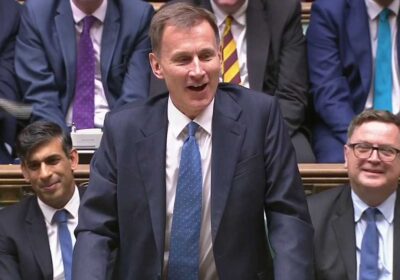Exact date National Insurance will be cut – with 27million Brits to get massive income boost – The Sun | The Sun

JEREMY Hunt has revealed the exact date National Insurance will be cut – with 27million Brits set to get a massive income boost.
The Chancellor said he is bringing in "urgent legislation" so the 2% cut comes into effect on January 6 next year.
Jeremy Hunt said: "High employment taxes on 27million people working in the public and private sectors also disincentivise the hard work we should be encouraging.
"On top of income tax at 20%, they pay 12% National Insurance on earnings between £12,570 and £50,270 – that's a 32% marginal tax rate.
"If we want people to get up early in the morning, if we want people to work nights, if we want an economy where people go the extra mile and work hard then we need to recognise that their hard work benefits all of us.
In his Autumn Statement Jeremy Hunt announced:
Read More Autumn Statement

Nurses & teachers get £600 in boost for frontline workers – see how you'll save

Joy for drinkers as pints and spirits stay the same price in budget boost
- The biggest ever price hike for tobacco products
- A major win for The Sun's Save Our Sups campaign with alcohol duty frozen
- A major benefit change for renters on Universal Credit
- A £10,000 energy bill discount for Brits living near pylons
- A £350 income boost for self-employed workers
- A £470 payment boost for millions on Universal Credit
- Millions will be stripped of benefits under harsh new rules
- Nurses will save £500 in a personal income tax cut
- No fuel duty hike in huge relief for drivers
To do this, Mr Hunt said the main 12% rate of employee National Insurance will be cut.
He said: "If I cut it by one percentage point to 11%, that would be an extra £225 in the pockets of the average worker every year.
"But instead, I'm going to go further and cut the main rate of Employee National insurance by two percentage points from 12% to 10%."
Most read in Money

Pay day for Brits as Hunt’s mini-Budget boosts purses but hikes tobacco price

Millions to be forced into work with new benefits rules & strict deadline

Brits have £10,000 SLASHED off bills based on location – are you eligible?

Cost of cigarette pack to rise from TONIGHT in huge blow to smokers
This change will help 27million people and it means that someone earning an average salary of £35,000 will save over £450.
He added: "For the average nurse, it is a saving of over £520 and for the typical police officer it is a saving of over £630 every single year.
"I would normally bring in a measure like this for the start of the new tax year in April.
"But instead tomorrow I'm introducing urgent legislation to bring it in from January 6, so that people can see the benefit in their payslips at the start of the new year."
What is National Insurance?
National Insurance is a tax on your earnings, which is put into a fund to use for some state benefits.
This includes the state pension, statutory sick pay, maternity leave and unemployment benefits.
If you are a UK national, you should receive an NI number and card automatically before you turn 16.
This number allows the government to track your earnings and apply the right amount of tax.
Who pays National Insurance?
You pay National Insurance if you’re 16 or over and either:
- an employee earning above £242 a week
- self-employed and making a profit of £6,725 or more a year
It is deducted from your wages each month.
If you're employed, you can see your contributions by looking at your pay slip.
Once you reach state pension age, you don't need to pay it at all.
There are different types of National Insurance – known as "classes" -, and the type you pay depends on your employment status and how much you earn, and whether you have any gaps in your National Insurance record.
What are the current NIC thresholds and how much do I pay?
The threshold for National Insurance payments is currently £12,570 a year for employed workers and £6,725 for self-employed people.
A change in April last year saw millions of workers paying 1.25% more NI, but that hike was reversed from November 6, saving workers £330 a year on average.
But rates fell from 13.25% to 12% and from 3.25% to 2% – the same as before April 2022.
If you are employed, you start paying National Insurance when you are 16 or older.
Most people now pay 12% NICs on any earnings between £242 and £967 a week.
Plus you have to pay 2% on anything you earn over £967 a week – or £4,189 per month.
Those earning less than these amounts do not have to pay any National Insurance.
The self-employed start paying when they make profits of at least £6,725 a year.
If you're self-employed you need to complete a self-assessment tax return and pay NICs and income tax yourself.
The exact amount you pay will depend on how much you earn as it's a percentage of earnings between these amounts.
Source: Read Full Article
